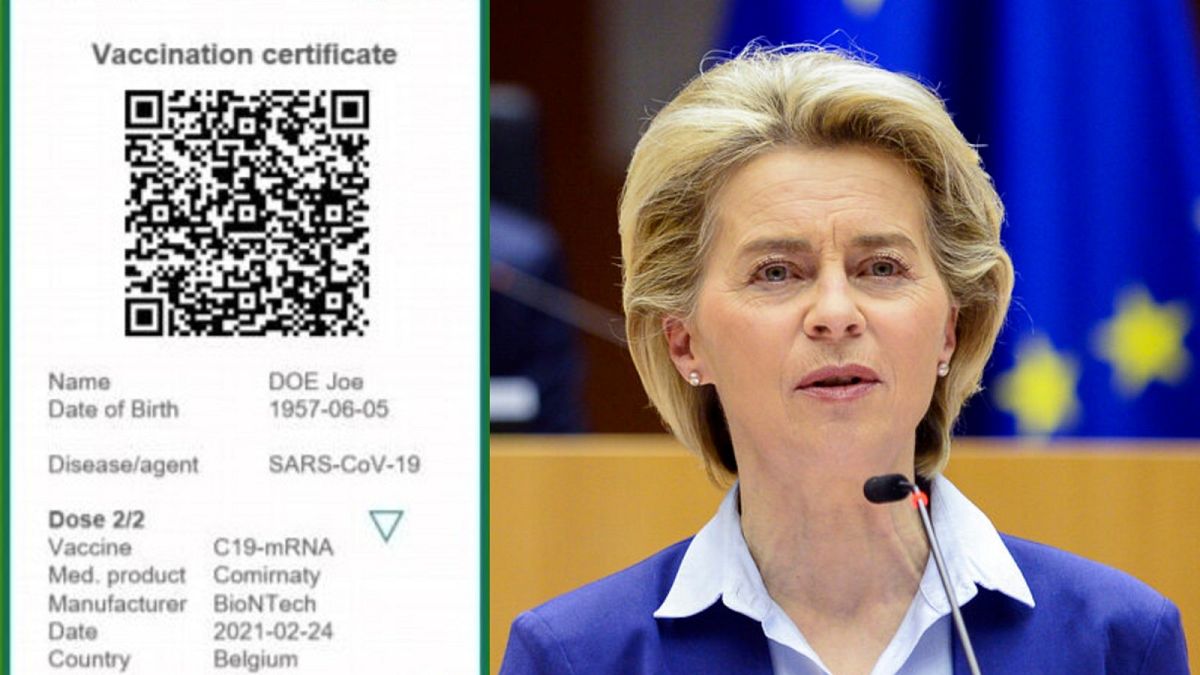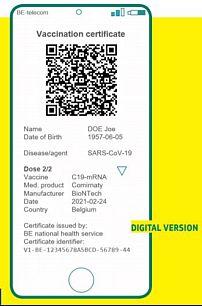What does the pass allow you to do? What does it tell border control about you? And why is 'reciprocity' the new buzzword? Find out here.
On Wednesday, the European Commission proposed to create a Digital Green Certificate to facilitate safe free movement inside the EU during the COVID-19 pandemic.
The Digital Green Certificate will serve as an assurance that a person has been vaccinated against COVID-19, received a negative test result or recovered from COVID-19. It will be available, free of charge, in digital or paper format. It will include a QR code to ensure security and authenticity of the certificate.
What is it and how does it work?
The EU's vaccine passport - officially called Digital Green Certificate - will be free of charge, bilingual, interoperable, secure, non-discriminatory and available in digital and physical format via QR code.
Its goal will be to facilitate "safe and free movement" inside the EU during the pandemic.
The Digital Green Certificate will comprise three distinct certificates:
- Vaccination certificates, stating brand of the vaccine used, data and place of inoculation and number of doses administered.
- Negative test certificates (either a NAAT/RT-PCR test or a rapid antigen test). Self-tests will be excluded for the time being.
- Medical certificates for people who have recovered from COVID-19 in the last 180 days.
What about the EMA-approved stipulation?
The vaccination certificates will be based on jabs approved by the European Medicines Agency (EMA). But, in a very important clarification, the Commission said that individual member states could decide whether or not they accept vaccines that EMA has not yet green-lighted. Countries like Hungary are already deploying shots from Sputnik V, from Russia, and Shinopharm from China.
"Where member states accept proof of vaccination to waive certain public health restrictions such as testing or quarantine, they would be required to accept, under the same conditions, vaccination certificates issued under the Digital Green Certificate system," the Commission said in a statement.
"This obligation would be limited to vaccines that have received EU-wide marketing authorisation, but member states can decide to accept other vaccines in addition."
The instrument will be valid in all EU countries and will be open for Iceland, Liechtenstein, Norway as well as Switzerland. It will be issued to EU citizens and their family members, regardless of their nationality.
Additionally, non-EU nationals who reside in the bloc and visitors who have the right to travel to other member states will also be allowed to apply for the certificate.
Digital, physical and with QR code
A QR code will be the most visible element of the passport. The code will ensure "security and authenticity" and will contain only the "essential information", such as date of birth, date of issuance, relevant certificates and a unique identifier.
To overcome the digital divide, the certificate will be available in both digital and physical (paper) forms and will be displayed in two languages: the official language of the issuing member state as well as English.
The Commission will not create a database from scratch, but instead will build a so-called "gateway" and support member states to develop software that national authorities can use to verify all certificate signatures across the European Union. Personal data won't be retained by the verifying country.
The EU certificate will facilitate cross-border movement for work and tourism but will not automatically exempt holders from complying with public health restrictions in place.
"Member states remain responsible to decide which public health restrictions can be waived for travellers but will have to apply such waivers in the same way to travellers holding a Digital Green Certificate," the Commission said.
"If a member state continues to require holders of a Digital Green Certificate to quarantine or test, it must notify the Commission and all other member states and explain the reasons for such measures."
A temporary but long-awaited solution
The implementation of EU-wide certificate is eagerly anticipated by tourism-reliant countries like Spain, Greece and Croatia, which need a summer rebound in order to kick start their badly damaged economies. Consensus among member states has been progressively growing since the start of the vaccination campaign, but the irregular and disappointing pace of inoculation has cast some doubts over the initiative.
The legal text was presented by European Commission President Ursula von der Leyen alongside Commissioners Thierry Breton (Internal Market) and Didier Reynders (Justice).
The Commission is aware that, if it wants to have the certificate ready in time for the summer, the proposal will have to go through a faster-than-usual adoption process in both the European Parliament and the Council.
The executive urged member states to "implement the trust framework and technical standards, agreed in the eHealth network, to ensure timely implementation of the Digital Green Certificate, their interoperability and full compliance with personal data protection".
The Digital Green Certificate system is a temporary measure, the Commission underlined. The instrument will be suspended once the World Health Organization (WHO) declares the end of the international health emergency.
"The Digital Green Certificate will not be a pre-condition to free movement and it will not discriminate in any way. A common EU-approach will not only help us to gradually restore free movement within the EU and avoid fragmentation," explained Commissioner Reynders.
WHO and ECDC voice opposition
Not everybody is on board the idea of vaccine passport.
In early February, the World Health Organization (WHO) published an interim position paper establishing its unambiguous opposition against "proof of COVID-19 vaccination for international travel as a condition for departure or entry".
The WHO cited a list of scientific, ethical, legal and technological considerations to dissuade governments from moving forward with the idea. The body considers "there are still critical unknowns regarding the efficacy of vaccination" such as how much jabs limit the transmission of the virus, how much they protect against asymptomatic infection and how long the immunity lasts.
"Considering that there is limited availability of vaccines, preferential vaccination of travellers could result in inadequate supplies of vaccines for priority populations considered at high risk of severe COVID-19 disease," WHO concluded.
Similar concerns were recently raised by Andrea Ammon, the director of the European Centre for Disease Prevention and Control (ECDC).
'Reciprocity and proportionality'
Speaking more generally about the health situation, President von der Leyen said the pandemic is "getting worse" in Europe and a "third wave" might be ongoing.
Von der Leyen praised manufactures Pfizer and Moderna for meeting their vaccine delivery targets during Q1 with 66 million and 10 million doses respectively, but once again criticised AstraZeneca for slashing its supplies so significantly over the same period (from 90 to 30 million doses). The president expects the company to provide 70 million doses throughout the second quarter of the year. The newly-approved single-shot vaccine by Johnson & Johnson will bring 55 million jabs in the coming months.
President von der Leyen also touched upon the exports of EU-made vaccines, which now amount to 41 million doses to 33 countries over the last six weeks. Von der Leyen said she's proud the EU is the most open region in the world when it comes to this kind of exports, but she now expects other countries to behave with "reciprocity and proportionality".
It's "hard to explain" to European citizens why the EU is exporting doses to countries that also produce vaccines, "but nothing is coming back to the European Union", she pointedly remarked. "Open roads run in both directions."
The Commission president is now explicitly asking third countries to allow vaccines produced in their territory to enter the European Union. If the health situation continues to deteriorate, she added, the executive will have to revise and adapt the exports mechanism control, which has been in place since February 1, in order to make sure this reciprocal behaviour is materialised.
Export requests could be decided on the basis of two criteria: the level of openness of the third country and its pace of vaccination compared to that of the EU. This means that, if a third country expecting exports from the EU is ahead of the bloc in its inoculation campaign, the demand could be rejected.
"All options are on the table," von der Leyen said, without providing additional details. She will discuss the potential measures with EU leaders in the Council later this month.

